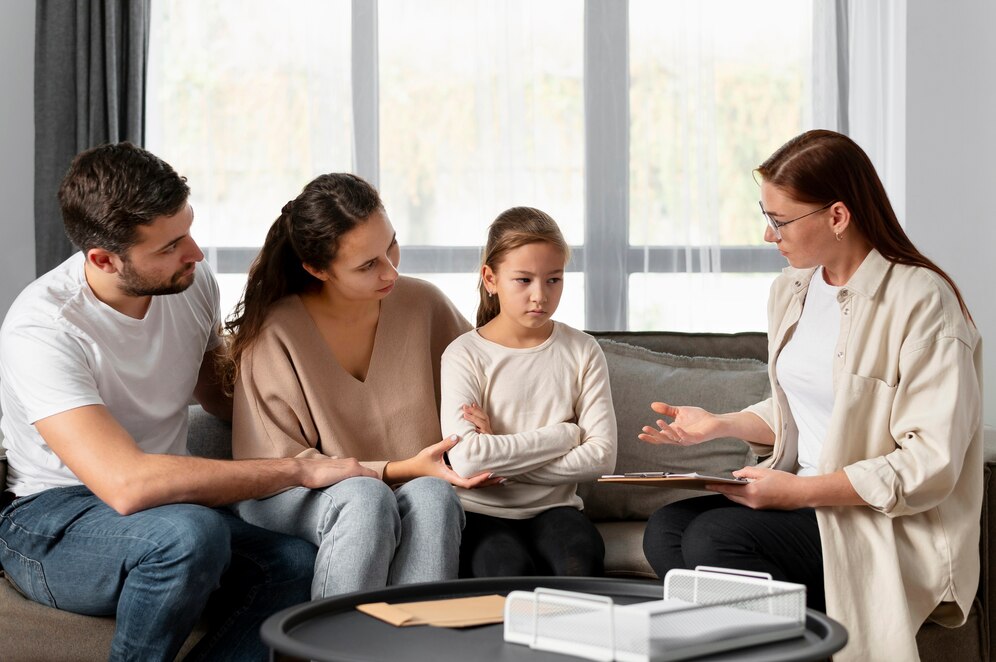The Parenting & Family Blog

How to Talk to Kids About Difficult Topics Like Death and Divorce
Talking to children about challenging topics such as death and divorce is never easy. These conversations require a delicate balance of honesty, empathy, and sensitivity. Parents, guardians, or caregivers should think carefully about these topics. This helps children understand and deal with the changes in their lives. This article will look at the best ways to talk about tough topics with kids. It will focus on explaining divorce to children and helping them cope with loss. By the end, you’ll be better equipped to handle these difficult conversations with confidence and care.
Talking about tough topics with kids isn’t just sharing facts. It’s also about helping them understand their feelings, feel safe, and grow stronger. When handled with compassion and clarity, these conversations can strengthen the parent-child bond and teach children valuable coping skills. If you’re dealing with a divorce or helping a child cope with loss, your support is vital. It can greatly improve their emotional health.
Why It Matters

Helping Children Understand and Cope
Discussing difficult topics like death and divorce with children is essential for several reasons. First, it helps children deal with their feelings and grasp the changes around them. When left unaddressed, these topics can lead to confusion, fear, and anxiety in children. By openly discussing these issues, we provide them with the tools to navigate their emotions and build resilience.
Real-Life Applications
Consider the case of Emily, a six-year-old whose parents recently divorced. Her parents, unsure of how to explain the situation, avoided the topic. Emily became withdrawn and anxious. When her parents sat her down, they explained the divorce honestly. They also reassured her of their love. Slowly, she began to feel secure again. This example shows how clear and kind communication helps children deal with tough life events.
Data-Backed Insights
According to a study by the Journal of Child Psychology and Psychiatry, children who engage in open discussions about difficult topics tend to exhibit better emotional regulation and mental health outcomes. They are more likely to build healthy coping skills and keep stronger ties with their parents and friends.
Step-by-Step Guide to Explaining Divorce to Children

Preparing for the Conversation
Before talking about divorce, it’s important to get ready mentally and emotionally.
Effective Preparation Steps:
- Understand Your Emotions: Acknowledge your feelings about the divorce and ensure you are in a stable emotional state before discussing it with your child.
- Choose the Right Time and Place: Pick a quiet, comfortable setting where your child feels safe and secure.
- Collaborate with Your Co-Parent: If possible, discuss with your co-parent how you will address the topic. Presenting a united front can help reassure your child and provide a sense of stability.
Explaining Divorce to Children
When explaining divorce to children, it is essential to use age-appropriate language and be as honest as possible.
Tips for Explaining Divorce:
- Use Simple, Clear Language: Avoid complex legal terms. Instead, use straightforward explanations like: “Mummy and Daddy have decided to live in separate houses, but we both still love you very much.”
- Be Honest Yet Reassuring: Explain the situation truthfully but avoid sharing unnecessary details.
- Encourage Questions: Allow your child to ask questions and express their feelings. Validate their emotions with empathy.
- Reassure Your Child: Emphasise that the divorce is not their fault and that both parents will continue to love and care for them.
Helping Kids Cope with Divorce
Once the conversation has taken place, it is essential to support your child as they adjust to the changes.
Strategies for Supporting Your Child:
- Maintain Routine: Keep your child’s daily routine as consistent as possible. Stability fosters a sense of security.
- Validate Their Feelings: Encourage your child to express their emotions through talking, drawing, or journaling.
- Seek Professional Support: If your child is struggling to cope, consider consulting a child therapist or family counsellor.
Step-by-Step Guide to Helping Kids Cope with Loss
Preparing for the Conversation
When discussing death with children, preparation is key.
Effective Preparation Tips:
- Reflect on Your Beliefs: Consider your family’s beliefs about death and how you want to convey them.
- Choose a Calm Setting: Find a quiet, comfortable place for the conversation.
- Gather Resources: Consider using children’s books or resources that explain death in an age-appropriate way.
Explaining Death to Children
When explaining death to children, honesty and sensitivity are essential.
Tips for Explaining Death:
- Use Clear, Direct Language: Avoid euphemisms like “gone to sleep” or “passed away” as they can confuse children. Instead, say: “Grandpa died, which means his body stopped working, and we won’t see him again.”
- Validate Their Emotions: Let your child know that it’s normal to feel sad, scared, or confused.
- Be Honest About the Permanence of Death: While it may be tempting to soften the reality, it is essential to be truthful about the finality of death.
- Encourage Questions: Allow your child to ask questions and provide honest, age-appropriate answers.
Helping Kids Cope with Loss
Supporting your child as they cope with loss is a gradual process.
Strategies for Coping:
- Encourage Emotional Expression: Let your child express grief through talking, creative activities, or physical outlets. Emotional expression is important for your child’s development.
- Create Memory Rituals: Help your child remember the loved one they lost. They can make a scrapbook or light a candle in their honour.
- Maintain Stability: Keep routines consistent to create a sense of normalcy.
- Be Patient: Grief is a long-term process, and children may process it gradually over time.
Additional Expert Tips & Common Mistakes to Avoid
Expert Tips for Talking About Difficult Topics
- Use Age-Appropriate Language: Tailor your language to your child’s age and developmental stage.
- Validate Their Feelings: Let your child know it’s okay to feel sad, angry, or confused.
- Offer Comfort and Reassurance: Regularly remind your child that they are loved and supported.
- Model Healthy Coping Skills: Show healthy ways to handle emotions. Talk about your feelings. Practice relaxation techniques.
Common Mistakes to Avoid
- Avoiding the Topic: Not talking about death or divorce can lead to confusion and fear.
- Overloading with Information: Providing too much information at once can overwhelm your child.
- Using Euphemisms: Phrases like “gone to sleep” can confuse children and create fear around sleeping.
- Minimising Their Feelings: Statements like “Don’t be sad” can invalidate your child’s emotions. Instead, acknowledge their feelings with empathy.
Advanced Insights and Expert Recommendations
Addressing Different Developmental Stages
Children’s understanding of death and divorce varies by age.
Age-Appropriate Explanations:
- Young Children (2-6 years): Use simple, clear language. Avoid abstract concepts.
- School-Age Children (7-12 years): Offer more detailed explanations while remaining gentle and reassuring.
- Teens (13+ years): Engage in open, honest discussions. Respect their need for independence while providing emotional support.
Utilising Books and Stories
Books can be powerful tools for helping children understand difficult topics.
Recommended Books:
- The Invisible String by Patrice Karst: A story about loss and connection.
- Two Homes by Claire Masurel: A comforting book about divorce.
- When Dinosaurs Die by Laurie Krasny Brown: A child-friendly guide to understanding death.
Seeking Professional Support
If your child is struggling significantly, consider consulting a child psychologist or counsellor.
Signs to Seek Help:
- Persistent changes in mood or behaviour.
- Difficulty sleeping or eating.
- Withdrawal from friends or family.
Talking to Kids About Divorce and Death: A Compassionate Guide
Talking about tough subjects like death and divorce with kids is hard but important for parents. Talking honestly and with care can help your child deal with changes in their life.
Remember to be patient, provide reassurance, and encourage open communication. This will help your child understand their feelings and grow stronger in the future.
What strategies have you found effective when discussing difficult topics with your child? Share your insights and experiences in the comments below. Let’s support each other through these meaningful conversations!









